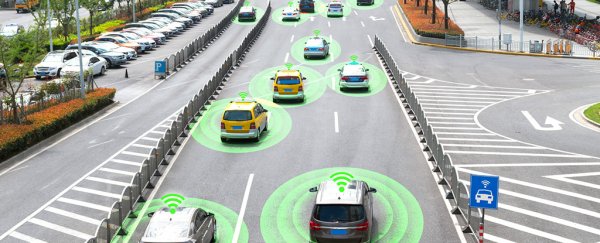We know that self-driving cars are promising to make the roads safer and give us more time to relax, but the energy-saving and pollution-cutting benefits are also important. Now a new study suggests those benefits might not be as big as we thought.
The problem, according to researchers from the University of Michigan, is that autonomous vehicles will be so convenient and so efficient that we might all start spending more time in our cars.
It sounds like a strange side-effect, but let's hear them out for a minute.
The new research actually backs up many of the positives that will go alongside the self-driving car revolution, but the team warns that we need to be smarter about calculating how much they'll improve traffic flow and cut down on energy use.
"The core message of the paper is that the induced travel of self-driving cars presents a stiff challenge to policy goals for reductions in energy use," says one of the researchers, Samuel Stolper.
Stolper and his colleagues looked at data on existing travel behaviour and economic theory, in particular the "rebound effect" – the idea that when people save money on travel, they travel more, thus offsetting any benefits.
Of course, self-driving cars don't just save on fuel. Their efficient route-planning and driving styles promise to save people time too – you'll be able to spend car journeys reading, or watching movies, or catching up on some work.
This is the first study to look at both fuel cost and time cost, the researchers say, and they warn that a perceived time cost saving of 38 percent or higher could be enough to encourage people to travel in their cars more, cancelling out some of the energy savings.
"Thus, much higher energy efficiency targets are required for self-driving cars," says one of the team, Ming Xu.
So if self-driving tech is going to make car journeys cheaper, more fun, and more convenient, we'll all be spending more time on the road. Our cities might not end up being as free from traffic jams as we thought.
Having crunched the numbers, the researchers predict households will spend between 2 and 47 percent more time in their cars – and the wealthier you are, the more driving you're likely get your robot car to do, the study suggests.
While we all get used to the idea of having software algorithms and hardware sensors get us from A to B, it's crucial that we know just how much of an impact this new type of vehicle is going to have on society and the environment.
The researchers note the improvements in "safety, energy efficiency, and time utilisation" that self-driving cars will bring, but warn against a backfire effect – a net increase in energy consumption overall, and the potential pollution that brings with it.
"Backfire – a net rise in energy consumption – is a distinct possibility if we don't develop better efficiencies, policies and applications," says lead researcher Morteza Taiebat.
The research has been published in Applied Energy.
